Introduction
Navigating the complexities of childbirth in the United States can feel overwhelming for tourists. It’s not just about bringing a new life into the world; it’s about facing legal, financial, and emotional hurdles. Have you ever wondered what it’s like to give birth in a foreign land? This article explores the significant disadvantages foreign visitors encounter when giving birth in America. From staggering medical costs that can soar into the tens of thousands of dollars to potential immigration repercussions that could impact future travel plans, the stakes are high.
What happens when the dream of a new life in the U.S. becomes tangled in legal scrutiny and financial strain? It’s crucial to understand these pressing issues if you’re considering childbirth away from home. You deserve clarity and support during this critical time. Remember, you’re not alone in this fight; we’re here to help you navigate these challenges.
Legal Consequences of Having a Child in the U.S. as a Tourist
Giving birth in America while on a tourist permit can lead to serious legal issues. While your child may automatically gain citizenship under the 14th Amendment, parents often face intense scrutiny regarding their immigration status. If officials suspect that the primary reason for your visit was to give birth, you could find your travel permission denied or canceled. The U.S. Department of State has made it clear that using a tourist permit mainly for childbirth is not acceptable. Those suspected of engaging in birth tourism may even face future entry ineligibility.
Travelers need to be cautious. Your motives can come under examination during permit applications or renewals, which could lead to legal complications. Reports indicate that pregnant women are increasingly at risk of having their travel authorizations denied, as consulates ramp up their scrutiny to combat suspected birth tourism. Each case is assessed individually, and failing to disclose previous childbirths or not being able to prove financial means for medical expenses can further jeopardize your visa status.
If you’re considering childbirth in the United States, it’s crucial to consult with an immigration lawyer to understand the desventajas de tener un hijo en estados unidos and help you navigate these complex legal waters. If you receive a subpoena or face immigration enforcement actions, remember to exercise your rights and seek immediate legal assistance from Vasquez Law Firm. We offer comprehensive legal services, including immigration, personal injury, criminal defense, and domestic law, ensuring you have the support you need during these challenging times.
We’re here to fight for your family. Your future matters to us. Yo Peleo - We Fight.
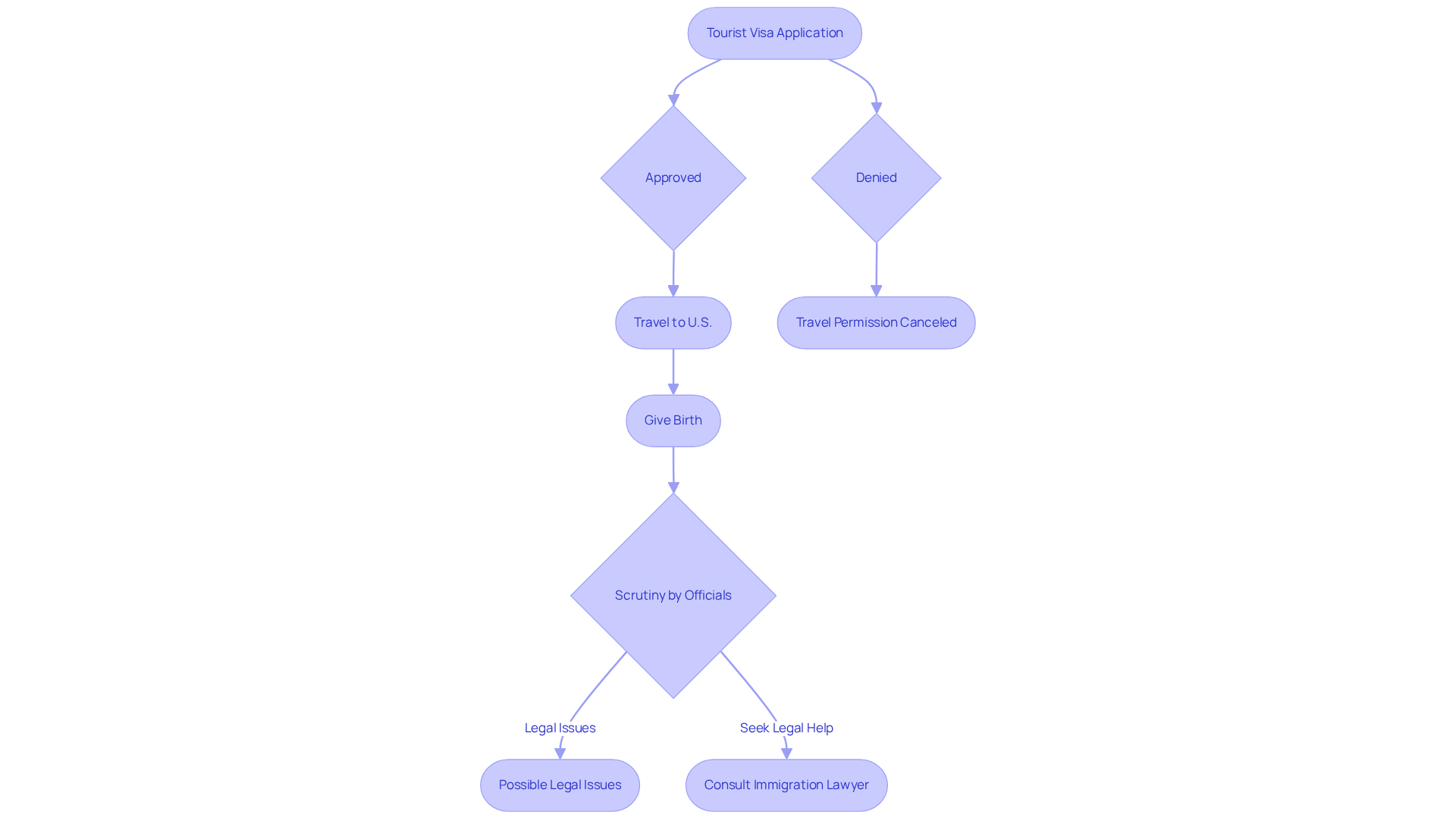
High Medical Costs for Childbirth in the U.S.
One of the desventajas de tener un hijo en estados unidos is that childbirth can be a heavy financial burden. The costs associated with the desventajas de tener un hijo en estados unidos typically range from $10,000 to $30,000, depending on the delivery method and hospital. For those without insurance, these expenses can skyrocket, illustrating the desventajas de tener un hijo en estados unidos, with the average cost of childbirth for uninsured births hitting around $18,865. Households may face out-of-pocket costs exceeding $52,500 for these births. The financial strain highlights the desventajas de tener un hijo en Estados Unidos, especially considering that cesarean deliveries can cost nearly $12,000 more than vaginal births.
If you’re a tourist planning to give birth in the U.S., it’s crucial to be aware of these costs. Consider securing travel insurance that includes maternity coverage, as many standard policies don’t. Even for insured births, the typical out-of-pocket expense of about $2,854 highlights some desventajas de tener un hijo en estados unidos, which can still be a challenge for families, especially those with limited financial means. Nearly 22% of adults under 30 with healthcare debt cite pregnancy and childbirth bills as contributing factors. It’s essential for expectant parents to prepare financially for the potential costs associated with childbirth in the U.S., as there are desventajas de tener un hijo en estados unidos.
However, the financial implications are among the desventajas de tener un hijo en Estados Unidos that don’t stop at delivery. Families will also incur additional costs for prenatal care, postnatal visits, and newborn care. Understanding these expenses is vital for travelers navigating the complexities of childbirth in America. Remember, you’re not alone in this fight - we’re here to support you every step of the way.
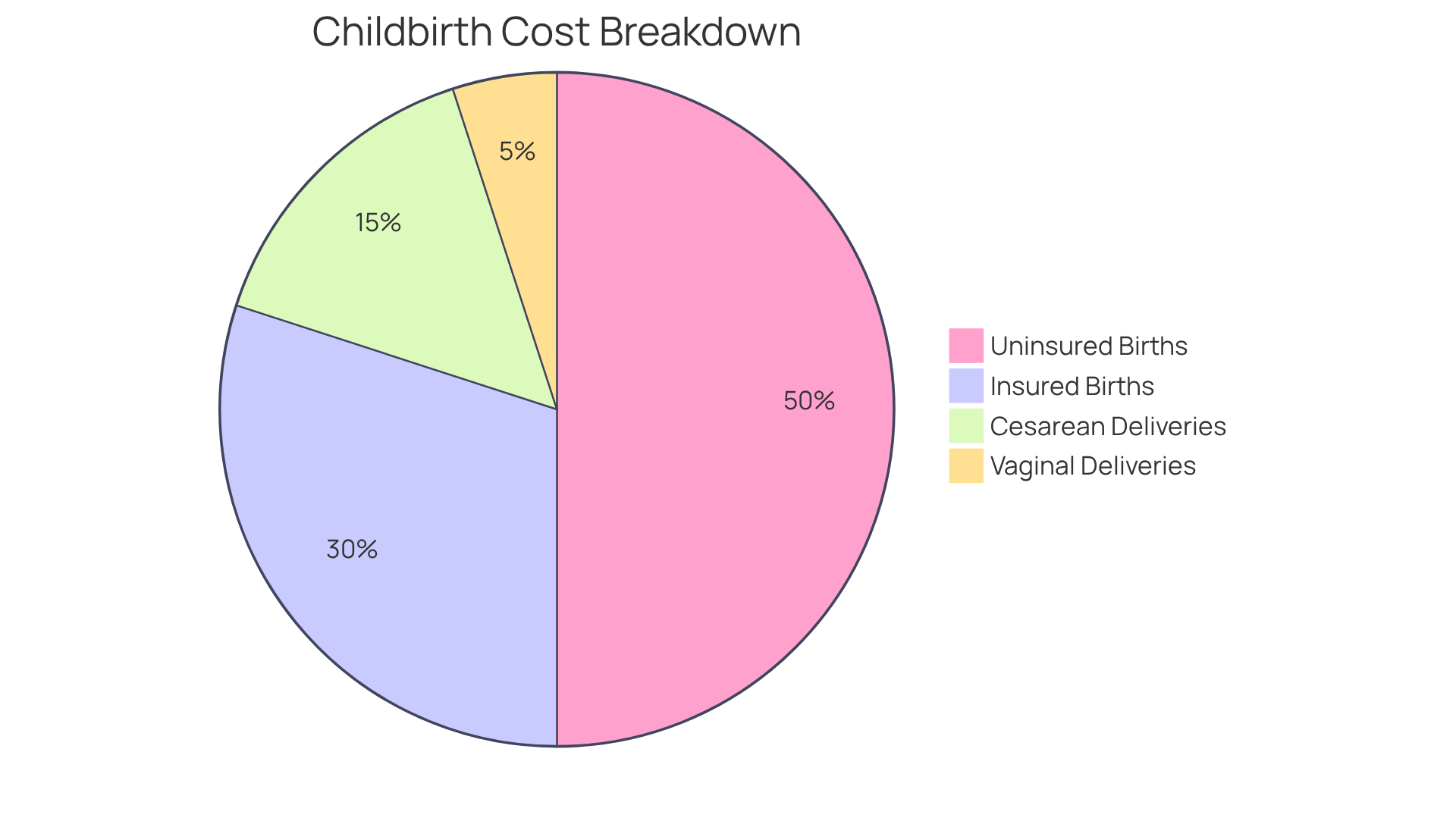
Immigration Challenges After Giving Birth in the U.S.
Giving birth in the U.S. can lead to significant challenges for parents on tourist permits, which are among the desventajas de tener un hijo en estados unidos. Have you ever felt overwhelmed by the immigration process? Authorities often scrutinize these cases, interpreting childbirth as a potential attempt to secure residency through the child, which brings to light the desventajas de tener un hijo en estados unidos. This perception can lead to increased examination in future travel applications, as consular officers become more watchful about signs of birth tourism, highlighting the desventajas de tener un hijo en Estados Unidos. Statistics show that pregnant and young women face a greater risk of denial due to this heightened scrutiny, which underscores the desventajas de tener un hijo en Estados Unidos and illustrates a troubling pattern in immigration enforcement.
Parents who give birth in the U.S. may encounter various immigration hurdles, which are among the desventajas de tener un hijo en estados unidos after delivery. If officials suspect that the primary purpose of their visit was to give birth, they could face revocation of their permit or rejection of future applications, highlighting the desventajas de tener un hijo en estados unidos. Immigration attorneys stress the importance of transparency and consistency in applications. Misrepresentation can lead to prompt denial and long-term ineligibility for entry. As one immigration lawyer noted, "Misrepresentation can lead to severe repercussions, not only for the individual but also for their relatives, who may encounter eligibility problems due to this."
The consequences of childbirth extend beyond direct legal issues; they can also impact the eligibility of relatives for travel permits. A record of birth tourism can result in increased examination or refusal of future travel applications, which illustrates some desventajas de tener un hijo en estados unidos that affect family members' ability to obtain permits.
Given these complexities, it’s crucial for guardians to seek legal counsel to navigate the intricacies of American immigration laws effectively. Consulting with an experienced immigration attorney can help mitigate risks and ensure compliance, especially for those facing sensitive travel issues related to childbirth. Furthermore, parents need to be aware of the regulation changes concerning B nonimmigrant permits enacted on January 24, 2020, which directly pertain to childbirth and eligibility for permits. Remember, you’re not alone in this fight - there are professionals ready to support you.
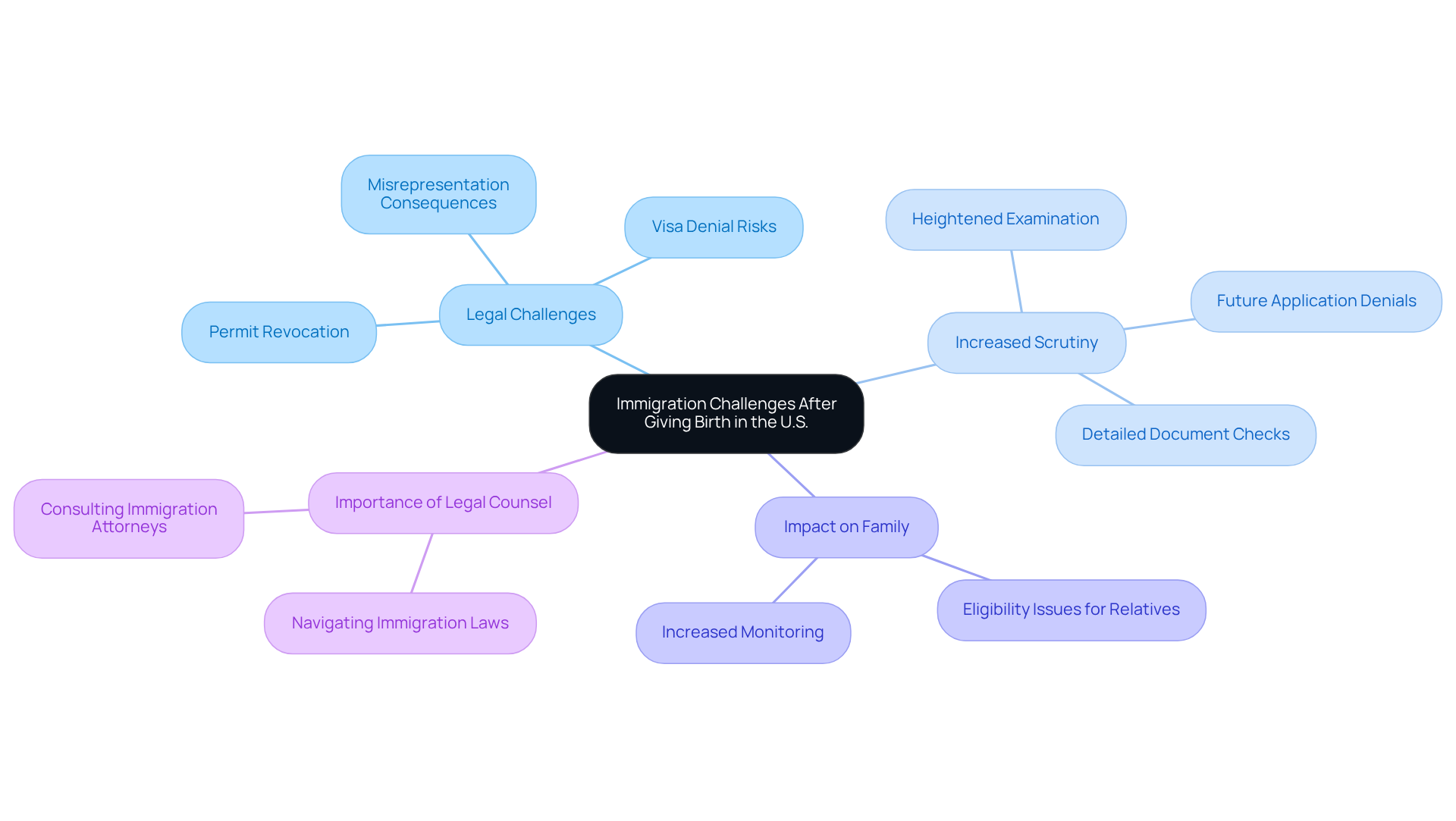
Impact on Future Visa Applications and Immigration Status
There are desventajas de tener un hijo en estados unidos that can create significant hurdles for future entry applications for tourists. Have you ever felt overwhelmed by the complexities of immigration? If officials determine that a visitor's primary reason for coming to the country was to give birth, it can illustrate the desventajas de tener un hijo en Estados Unidos, leading to rejections for future applications-whether for travel, study, or work permits. In 2020, at least 33,000 births occurred among women on tourist permits, underscoring the scale of this issue.
Recent actions by the American Mission to Nigeria and other embassies have made it clear: permits will be denied if the main purpose of travel is childbirth for citizenship, which illustrates the desventajas de tener un hijo en estados unidos. Immigration lawyers emphasize that misrepresentation during the application process can result not just in immediate rejections but also in long-term disqualification from entering the country. For instance, a California woman faced prison time for facilitating birth tourism, marking a significant crackdown on this practice.
These cases highlight the increased scrutiny surrounding visa requests for individuals believed to be traveling to the U.S. to give birth, reflecting the desventajas de tener un hijo en estados unidos. It’s crucial for future guardians to understand how their travel intentions can impact their immigration status. Remember, you’re not alone in this fight-we’re here to support you every step of the way.
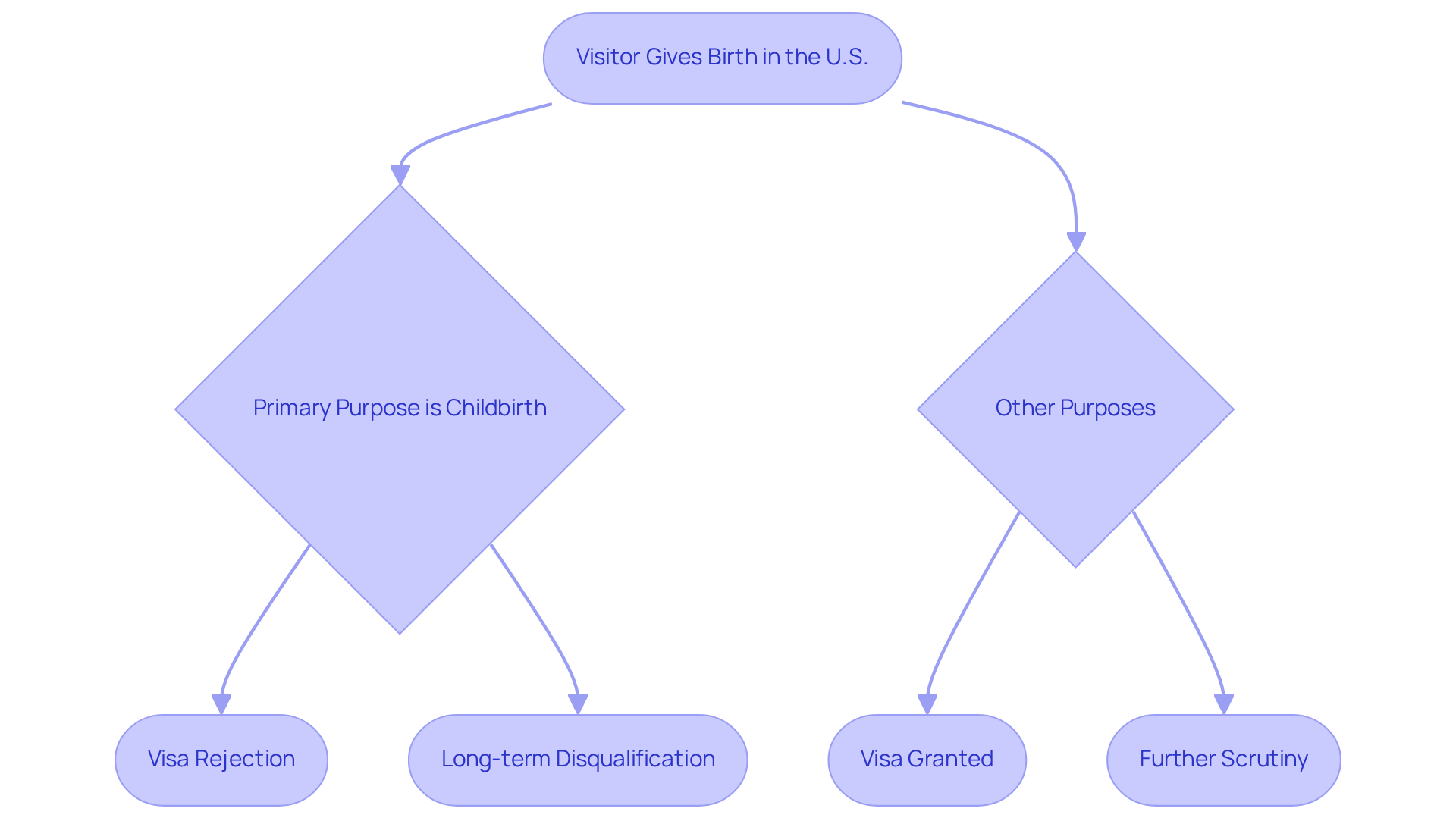
Complications in Accessing Healthcare Services for Newborns
Newborns born to tourists face serious challenges in accessing healthcare services. Many hospitals in America require proof of insurance or upfront payment, creating barriers for guardians who may not have adequate coverage. This lack of insurance can delay critical medical attention, putting the newborn's health at risk. In 2023, over 4.4 million children in the U.S. were uninsured, highlighting a broader issue that affects not just citizens but also those born to non-resident guardians.
Families unfamiliar with the healthcare system often struggle even more, leading to delays in necessary care. Common complications like respiratory issues or jaundice need immediate medical intervention. Without insurance, guardians may find it hard to access essential services, which can result in negative health outcomes for their children.
Moreover, the financial strain of unexpected medical bills can be overwhelming, especially for families already navigating the complexities of immigration and residency. It’s crucial for expectant individuals to be aware of the desventajas de tener un hijo en estados unidos and prepare accordingly. Remember, you’re not alone in this fight-we’re here to support you every step of the way.
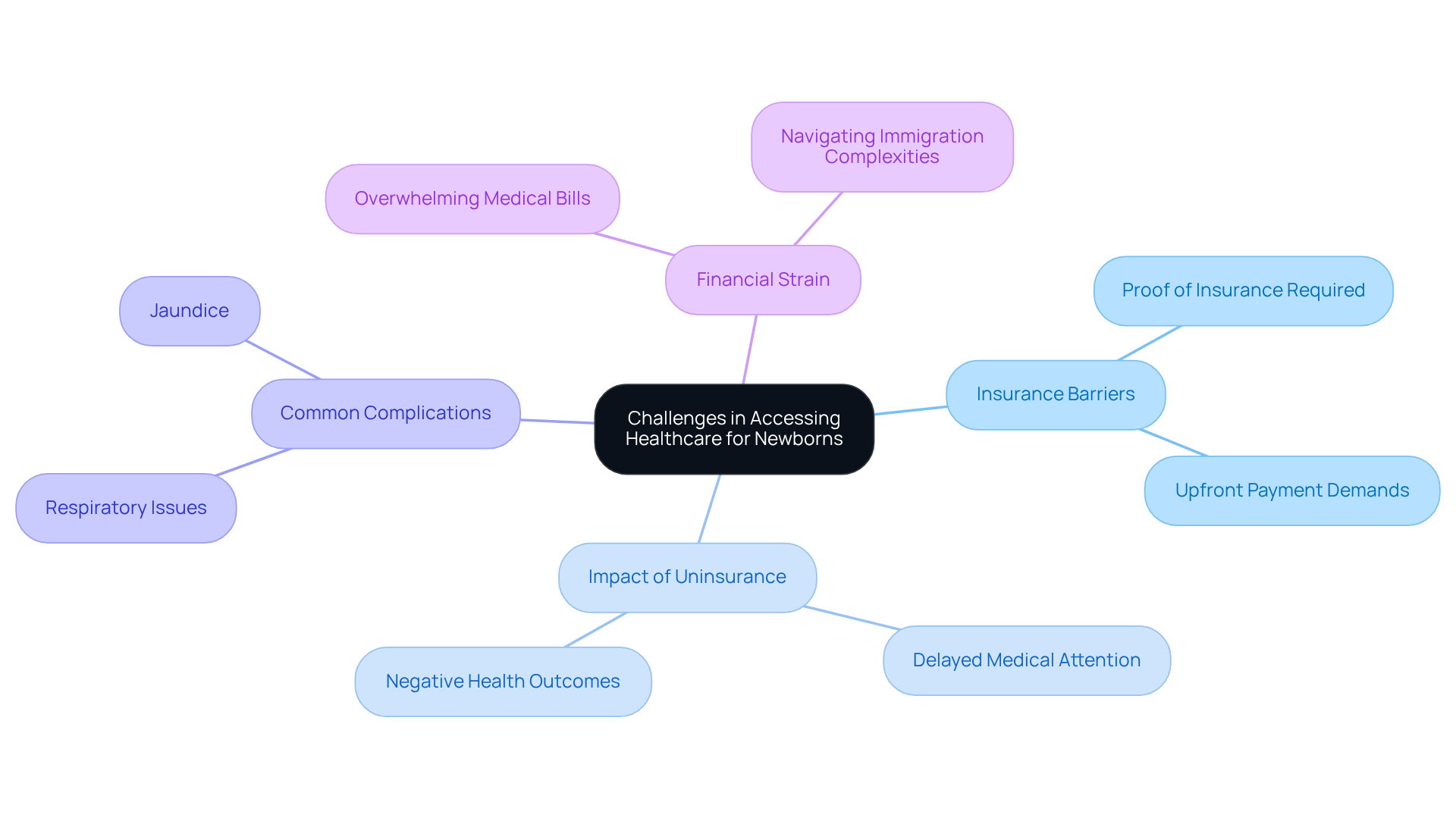
Legal Repercussions of Unpaid Medical Bills for Childbirth
Failing to pay medical bills from childbirth can lead to serious legal issues, including collections and lawsuits. Hospitals often report unpaid debts to credit agencies, which can hurt guardians' credit scores and limit future financial opportunities. Did you know that nearly 30% of people with unpaid medical or dental bills have been contacted by collection agencies? This shows just how widespread this problem is.
Financial experts stress the importance of knowing your financial responsibilities and seeking help when needed. Taking a proactive approach can reduce the risks tied to medical debt, especially for those who are aware of the desventajas de tener un hijo en Estados Unidos. The stress of unpaid bills can also lead to broader financial instability; in fact, 62% of individuals with health-related debt have avoided or delayed necessary care due to cost concerns. That’s why it’s crucial for guardians to be informed about their options and to use available resources to manage medical expenses effectively.
The Vasquez Law Firm is here to help. We offer accessible legal representation with no upfront costs for personal injury cases, ensuring that financial constraints don’t stop you from seeking justice. With our contingency fee structure, you pay nothing unless we win. Plus, we provide flexible payment plans and direct access to experienced attorneys who are dedicated to helping immigrant families navigate these challenges and secure the legal support they need.
With offices in Charlotte, Concord, and Huntersville in North Carolina, as well as locations in Florida, we’re strategically positioned to serve you wherever you are. Remember, your future matters to us - Yo Peleo - We Fight.
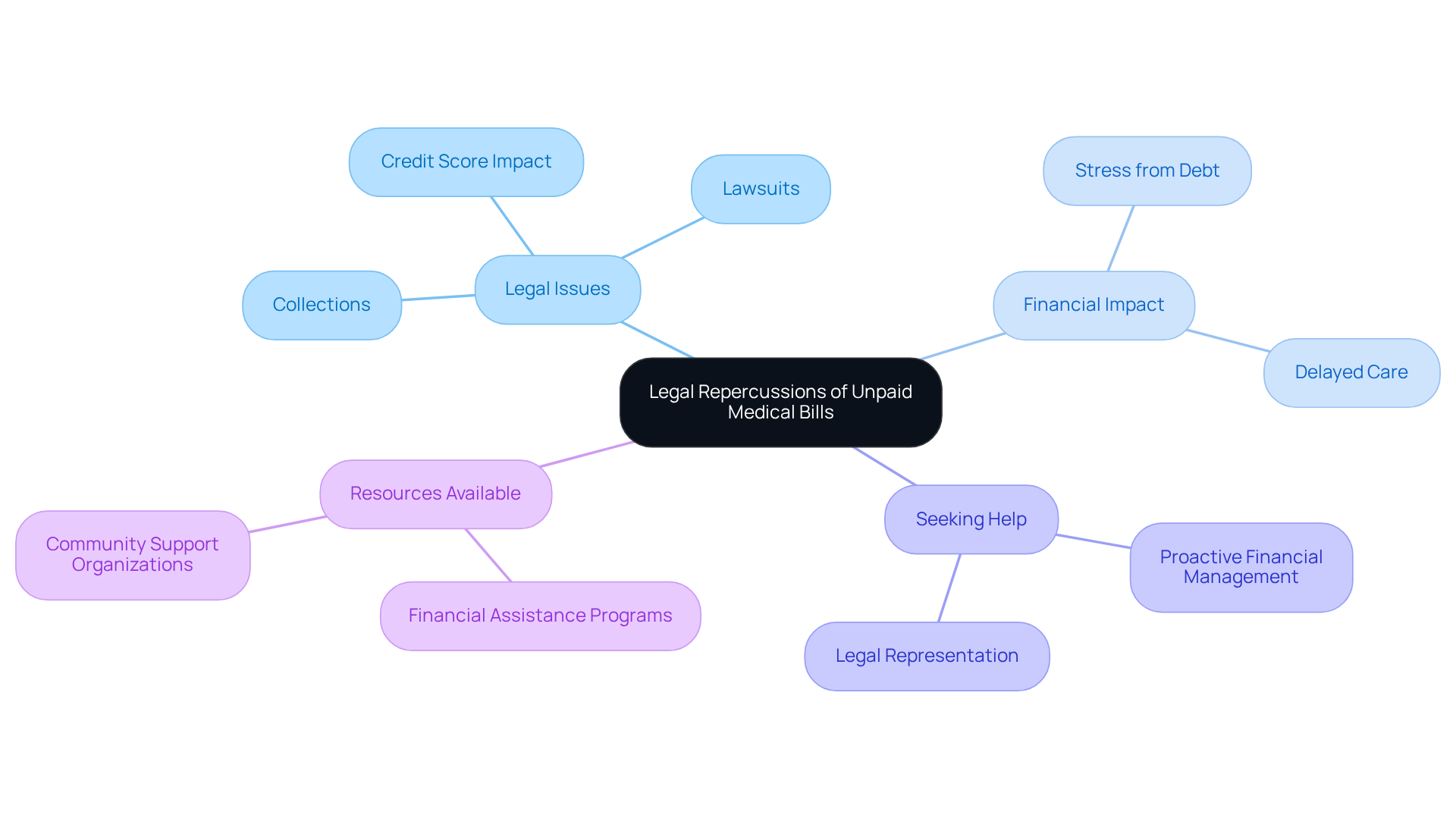
Emotional and Psychological Stress of Childbirth Abroad
Childbirth in a foreign country can be an emotional rollercoaster for caregivers. Many expatriate guardians find themselves feeling isolated and anxious about the medical care they receive, especially when cultural differences add to their stress. Did you know that 1 in 5 women in the U.S. face mental health or substance use disorders during the perinatal period? This statistic underscores the psychological hurdles many new caregivers encounter. Alarmingly, fewer than 20% of perinatal patients report being asked about their mental health, leaving many without the support they desperately need. Even more concerning, 75% of those with perinatal mental health issues never receive treatment. This highlights an urgent need for better support systems.
So, how can caregivers navigate these challenges? It’s crucial to actively seek emotional support and connect with local resources. Community-based support systems, like parenting groups and mental health services, can be a lifeline. The National Maternal Mental Health Hotline is a significant resource, offering 24/7 assistance for new caregivers facing mental health issues. This means help is just a call away when you need it most. Advocating for universal screening for maternal mental health can also help identify those in need early on. By tapping into these resources, expatriate caregivers can better manage the emotional and psychological stresses that come with childbirth in the U.S.

Cultural Differences Impacting Parenting Decisions
Cultural differences play a significant role in shaping parenting choices for families giving birth in the U.S. Immigrant guardians often find themselves navigating the tricky waters of blending their traditional practices with the norms of American society. This balancing act can lead to conflicts in parenting styles and expectations, making it essential to honor their heritage while adapting to a new environment.
Did you know that nearly 25% of U.S. children have at least one foreign-born guardian? This statistic underscores the rich tapestry of cultural backgrounds in American households and the unique challenges they face. Sociologists point out that immigrant families frequently encounter acculturation gaps, where adults and children adapt to American culture at different rates. This can create misunderstandings and tension. For instance, first-generation guardians might adhere to stricter, more traditional caregiving styles, while their children, raised in a different cultural context, may lean towards more liberal approaches.
Research shows that 90% of parents prioritize respect for cultural differences when raising their children. Furthermore, 65% actively seek resources to educate their kids about various cultures, as highlighted in The Bump's report. This commitment to cultural education is vital, fostering a sense of identity and belonging in children. Programs offering culturally responsive parenting education can significantly enhance parent-child communication and strengthen relationships, empowering immigrant households to navigate the complexities of their dual identities.
There are countless examples of immigrant families successfully merging their cultural practices with American parenting norms. Many households celebrate traditional holidays while also engaging in local community events, creating a vibrant mix of experiences for their children. This integration enriches children's understanding of their heritage and promotes cultural awareness and appreciation among their peers.
Ultimately, the impact of cultural practices on parenting choices in America highlights the importance of recognizing and valuing diverse parenting styles. By fostering an environment that honors and appreciates cultural variations, immigrant households can thrive, ensuring their children develop a strong sense of identity and belonging.

Complications in Child Custody Arrangements for Immigrant Families
Immigrant families often face significant challenges in child custody situations, especially when one guardian isn't a U.S. citizen. It's crucial to recognize that while courts are required to prioritize the child's best interests, immigration status can subtly sway custody decisions. Non-citizen guardians might encounter biases that affect how their stability and resources are perceived - key factors in custody evaluations.
Statistics reveal a stark reality: custody rates drop significantly for those who have been in the country for shorter periods. Only 11% of individuals living here for one to two years manage to secure custody. However, it’s vital to understand that U.S. immigration laws do not restrict a parent's right to pursue custody or visitation of their child, regardless of their immigration status.
Legal representation is essential. Attorneys at Vasquez Law Firm offer invaluable insights into how immigration status might indirectly impact custody rights. With over 30 years of experience and a remarkable 98% success rate, Vasquez Law Firm is dedicated to providing tailored legal support to immigrant families.
Parents are encouraged to know their rights and seek expert legal guidance to navigate these complex issues effectively. Your children's welfare should always be the priority in any custody arrangement. Contact William today for a confidential consultation, and let us help you protect your family's future. Our bilingual services ensure that language barriers won’t stand in your way as you pursue justice.

Understanding Legal Rights and Responsibilities as a Parent in the U.S.
Navigating the legal landscape of custody laws and healthcare access can be daunting for parents in America, especially for immigrant guardians facing unique challenges. Have you ever felt overwhelmed by the complexities of these laws? Understanding your rights is crucial. For instance, in most states, an unmarried mother automatically has sole legal and physical custody at birth unless the father takes steps to establish paternity. This can involve voluntary acknowledgment, court orders, or marriage. It’s vital to be proactive in understanding your parental rights.
Statistics reveal that nearly one in four children in the U.S. has an immigrant guardian, underscoring the need for clear legal frameworks to protect these families. Recent legislation, like California's AB 495, aims to enhance protections for children and families by ensuring licensed childcare facilities do not collect immigration-related information. This is a significant step in safeguarding parental rights during immigration enforcement actions.
We understand how overwhelming this feels. Experts stress the importance of legal preparation during pregnancy. Knowing custody laws can help guardians avoid common pitfalls in custody disputes, which can be particularly challenging for those unfamiliar with the legal system. By being informed about your rights and responsibilities, you can make choices that protect your interests and foster a stable, supportive environment for your children.
To further assist immigrant parents, accessing additional legal information about constitutional rights and the legal process is essential. Resources like court guides and legal forms can provide valuable support in navigating these challenges. For comprehensive legal services, including immigration, personal injury, and family law, Vasquez Law Firm is committed to offering compassionate representation. We’re here to fight for your family and help you navigate these complex issues.

Conclusion
Having a child in the United States as a tourist can be a daunting experience, filled with challenges that go beyond the joy of childbirth. The legal complexities, financial burdens, and healthcare access issues can create significant hurdles for foreign visitors. It’s crucial to understand these factors if you’re considering this path, as they can impact not just your immediate family but also future immigration opportunities.
Let’s break down some key issues:
- The legal implications of giving birth on a tourist visa
- The staggering costs associated with childbirth
- The potential for increased scrutiny during future visa applications
On top of that, the emotional and psychological stresses of navigating a foreign healthcare system, along with the necessary cultural adjustments, can complicate the experience even further. Each of these points highlights the multifaceted nature of childbirth in the U.S. for tourists, underscoring the need for thorough preparation and legal guidance.
Ultimately, deciding to give birth in the U.S. is not a choice to be made lightly. Prospective parents must seek comprehensive legal advice and financial planning to mitigate the risks involved. By staying informed and proactive, you can navigate the complexities of childbirth abroad more effectively, ensuring a smoother transition into parenthood while safeguarding your family’s future. Remember, understanding the disadvantages of having a child in the U.S. as a tourist is vital for making informed choices that protect both your child and yourselves. We’re here to fight for your family.
Frequently Asked Questions
What are the legal consequences of giving birth in the U.S. as a tourist?
Giving birth in the U.S. as a tourist can lead to serious legal issues, including scrutiny of the parents' immigration status. If officials suspect that the primary reason for the visit was childbirth, travel permission may be denied or canceled, and future entry ineligibility may be imposed.
How does the U.S. Department of State view using a tourist permit for childbirth?
The U.S. Department of State does not accept using a tourist permit primarily for childbirth. Those suspected of birth tourism may face increased scrutiny and potential denial of future travel authorizations.
What financial burdens are associated with childbirth in the U.S.?
The costs of childbirth in the U.S. typically range from $10,000 to $30,000, with uninsured births averaging around $18,865. Families may incur out-of-pocket expenses exceeding $52,500, particularly with cesarean deliveries costing significantly more than vaginal births.
What should tourists consider regarding medical costs before giving birth in the U.S.?
Tourists should be aware of the high medical costs associated with childbirth in the U.S. and consider securing travel insurance that includes maternity coverage, as many standard policies do not. Expectant parents should also prepare financially for prenatal, postnatal, and newborn care costs.
What immigration challenges might parents face after giving birth in the U.S.?
Parents may face significant immigration challenges if authorities suspect their primary purpose for visiting was to give birth, which can lead to permit revocation or denial of future applications. Misrepresentation in applications can result in severe repercussions for both the individual and their relatives.
How can parents navigate the immigration process after childbirth in the U.S.?
It is crucial for parents to seek legal counsel from an immigration attorney to navigate the complexities of U.S. immigration laws effectively, especially regarding childbirth. Transparency and consistency in applications are essential to mitigate risks.
What recent changes should parents be aware of regarding B nonimmigrant permits?
Parents should be aware of regulation changes concerning B nonimmigrant permits enacted on January 24, 2020, which directly relate to childbirth and eligibility for permits. Consulting with an immigration attorney can provide guidance on these changes.




